Chickens that roam freely in backyards or outdoors are likely to have worms in their droppings because they can easily eat infected insects, slugs, or contaminated droppings. The most common worms in chicken poop are tapeworms, gapeworms, chicken roundworms, cecal, and threadworms.
To get rid of worms in chicken poop, deworm the infected flock. Keep the chicken coop clean, disinfected, and aerated to reduce the humidity that attracts worm-infested insects. Then, stop free-ranging chickens during treatment until they are free from worms.
Worms in a chicken will be passed out in its droppings. The worms may be seen hanging out of the chicken’s cloaca in severe cases. Common signs of a severe worm infestation in chickens include;
- Severe weight loss.
- Poor eating habits.
- Losing feathers.
- Redundant growth.
- Reduced egg production.
- Difficulty in breathing.
- Severe chicken diarrhea.
- Droppings with blood stains.
Therefore, when you see worms in poultry droppings, the first measure is to identify them, know what they look like, and then take the required measures to control an infestation. A severe infestation can wipe out an entire flock if left without care.
Table of Contents
Pictures of worms in chicken poop + How they look like
The most common worms in chicken poop are cream, white, red, or brown, depending on their species and class. Stains from chicken droppings can also alter their appearance. Below are images of common worms that are often found in chicken poop;
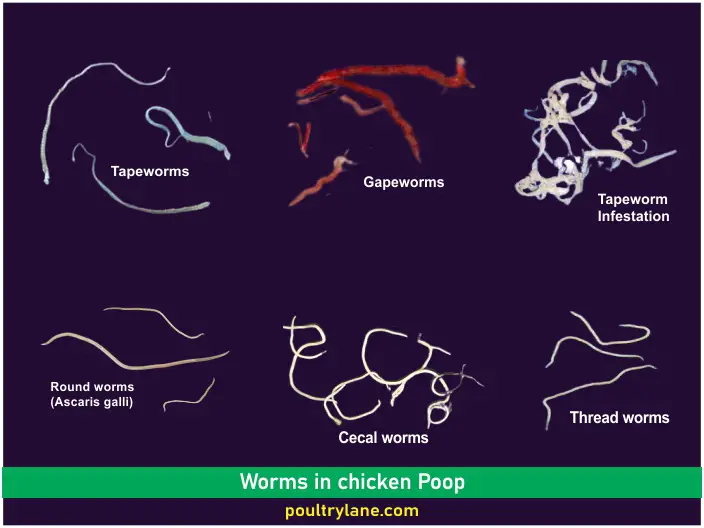
No products found.
As an Amazon Associate, we earn from qualifying purchases.
1. Chicken roundworms
Roundworms are the most common parasitic worms in chicken dropping. Scientists and researchers call them Ascaridia Galli, classified under the nematodes group as worms. Adults can measure up to 3 inches long and can easily be noticed if present in droppings.
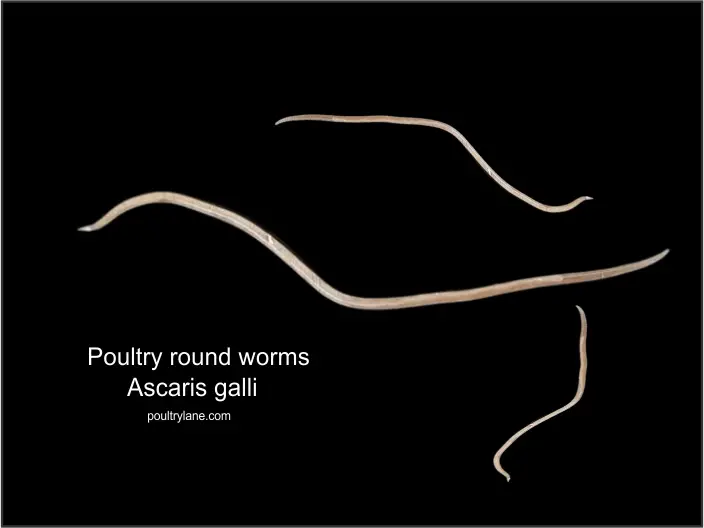
Those worms are cream white. In some cases, they may be colorless. However, it is still easy to spot them. Roundworms hide in the chicken’s gastrointestinal tract. Once they multiply, roundworms can be easily passed out in chicken stools. Normally, they are covered and stained in the waste.
While in the chicken, roundworms lay eggs that can be passed out in poop. Those eggs can survive in the soil for a long time, sometimes even a year. When free-range chickens eat food on the soil mixed with egg-infested droppings, they can easily pick the eggs and get infected.
Grown chickens used to roaming in the fields can comfortably live with a few worms in them. However, a serious infection can cause weight loss, loss of blood, and severe diarrhea in chickens.
2. Gapeworms
Gapeworms are also known as red worms because of their distinct red appearance. Usually, they attach themselves to the chicken’s bronchi, throat, or lungs. Chickens can get gapeworms when they eat food contaminated with gapeworm eggs or infected insects. Here is an image of an adult gape/red worm as it looks in a chicken’s poop;
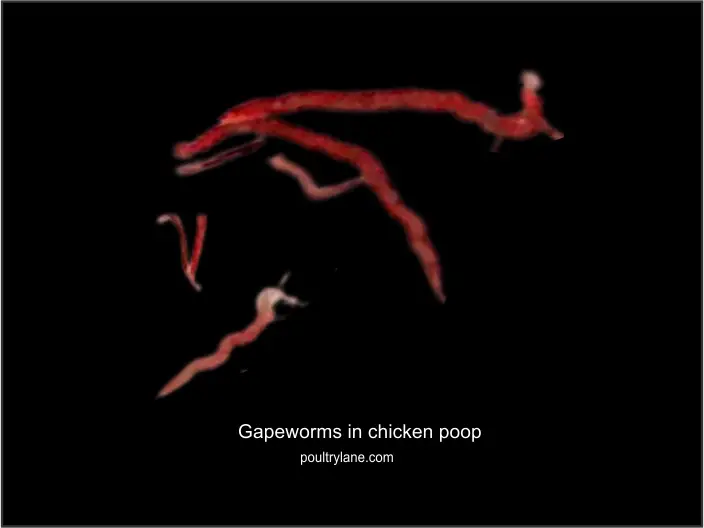
Gape worms attack the upper part of the respiratory system in birds and may cause breathing difficulties in chickens. This makes infected flocks gasp and stretch out their necks.
Young chickens are more vulnerable to gape/red worms if they are free-ranging in areas with wild birds. Wild birds carry a lot of worms in them. Their immunity, in most cases, is always stronger than domesticated poultry.
3. Cecal worms
Also known as Heterakis, cecal worms are white, adults are 1.5cm in length, and they usually attack a chicken’s cecum. The cecum is an important part of the digestive system. It helps in the re-absorption of water found in undigested food and further digestion of food moving across the intestine.
Cecal worms are commonly found on the ground or in droppings. Adult cecal worms lay eggs while hosted inside an infected chicken. Thus, cecal worms can be passed through poop.
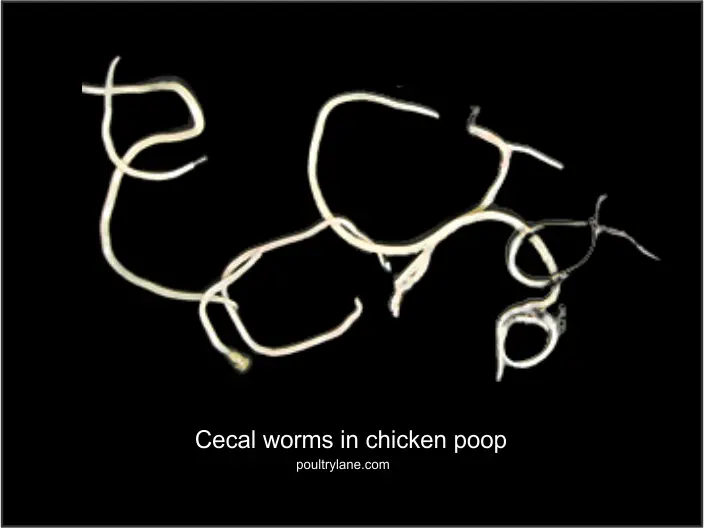
The worm is a leading vector for turkeys’ transmission of histomoniasis (blackhead disease). Chickens may not show other signs of infection except the presence of the parasite in droppings. It has also been observed that it is dangerous to turkeys compared to chickens.
Some worms may look like tiny white hairs. To see some worms like Protozoans, you may need a microscope. While it may not be fun to look for worms in droppings, it is still essential if you do not want to gamble on the health and safety of a flock.
4. Tapeworms
Tapeworms are common in summer when their hosts, like snails, flies, and earthworms, are everywhere. Once the eggs are ingested, they hatch in the chicken, and the adults are attached to the chicken’s intestines. This explains why they are known as intestinal worms.
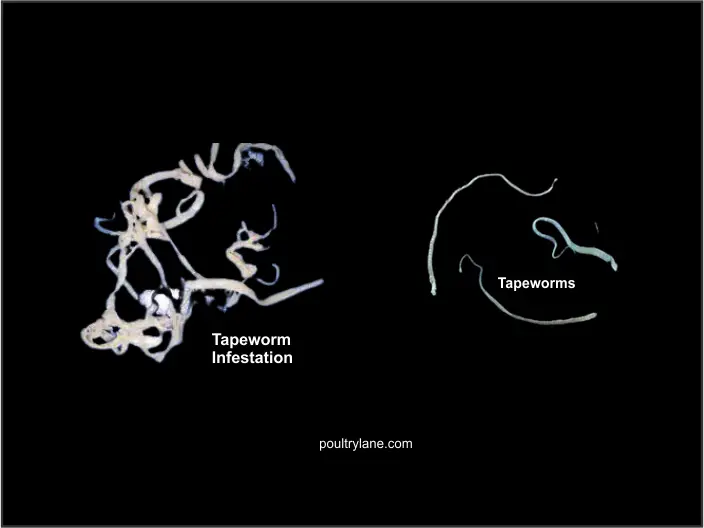
While an adult tapeworm can grow up to 13 inches long, some are tiny, so you can not see them easily. They have suckers on their head that are adapted for holding onto the chicken’s intestines. In most cases, tapeworms that affect chickens are specific since they specialize in breeding on a specific host.
5. Threadworms
Also known as Capillaria, threadworms in chickens are always found in the lower tract of a chicken’s intestine. Adult threadworms can block the intestines because they grow up to 15mm long. If this happens, the chicken can easily die. Tiny threadworms can sometimes be seen in chicken poop. However, adults are rarely passed out.
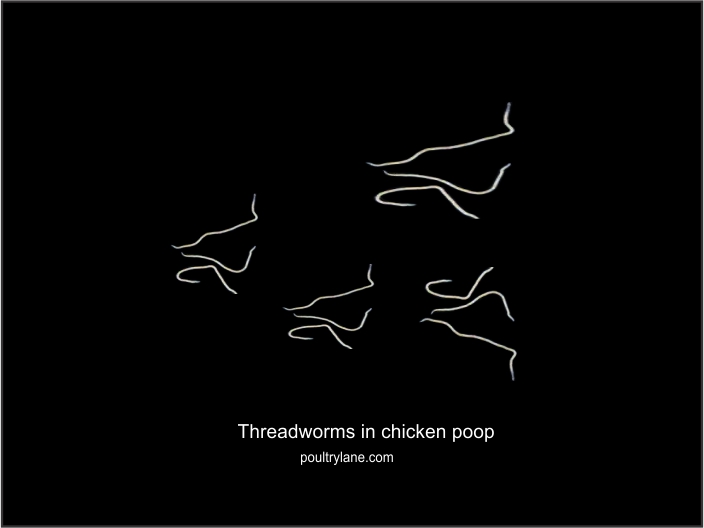
Infested chickens become lethargic since they are affected by anemia and severe diarrhea. These worms can kill an entire flock if the breakout is not controlled or treated early.
Threadworms are deadly because they can also multiply in chicken crops or the esophagus. When this happens, chickens will develop thickened or inflamed mucus membranes.
Causes of worms in chicken poop
Worms in chicken poop come from the chicken’s crop, oesiphogus or the intestines. Those worms are usually picked when chickens are in direct contact with sick birds or when they ingest food that contain the worm’s eggs. Chickens get worms when they eat infected insects like grasshoppers, cockroaches, or flies. Free-ranging chickens can also eat things like snails, earthworms, or slugs that are loaded with worms.
When a bird with worms poops, its droppings contain eggs left to spread around. Those eggs can lie where they are for months until they get a host. Because free-roaming birds peck around, ingesting the worms becomes easy. Later, the ingested worms are expelled in small amounts via poop.
Another potential cause of worms in chicken poop is the ingestion of secondary hosts. Since chickens are opportunistic eaters, they are known to eat anything on sight.
Chickens eat bugs and insects like earthworms, flies, and slugs that may already have worms. As a result, the chickens will also be infected.
No products found.
As an Amazon Associate, we earn from qualifying purchases.
How to get rid of worms in chicken poop
Getting rid of worms in chicken poop means you have to get rid of those worms in the chicken. After checking for the signs of infestation and identifying the worms, then you can proceed. However, never buy or give any treatment without the advice of a qualified avian vet.
1. Controlling roundworms
According to The College of Agricultural Science, Penn State Extension in The Pennsylvania State University, “Fenbendazole is the only product currently approved for treating and controlling roundworms (Ascaridia spp.) and cecal worms (Heterakis spp.) in chickens and turkeys in the United States. Fenbendazole is available as a medicated feed labeled for use in turkeys (Safe-Guard) or in a water-soluble formulation to be added to drinking water (Safe-Guard AquaSol) labeled for use in chickens.”
It has also been observed that grinding some garlic and mixing it in chicken drinking water can help manage the spread of roundworms in chicken poop. However, this should be used as a preventive measure since it is ineffective when terminating or managing a serious infestation.
When dealing with roundworms in chicken poop, an avian professional may recommend Piperazine, Aviverm, or Ivermectin. Do not give those without seeking their advice on how to give. It is difficult to manage an infestation independently because an avian will also need stool samples from the chicken before getting an effective control measure.
2. Gapeworms control
The best way to control gapeworms is to treat the whole flock if one chicken is infested. An avian vet will always recommend the best dewormers. In most cases, Avitrol Plus Bird Wormer Syrup is one of the best dewormers that works against gapeworms.
When treating gape worms, do it twice and give a 1-week break between the two treatments. This will ensure that all the worms are gone, and re-infestation will also be kept in good control.
3. Managing Cecal worms
Fenbendazole is the best treatment to help eliminate cecal worms and control them. However, you need to identify the worms before giving this. At poultrylane.com, we advise that you consult a Poultry veterinarian or an Avian vet to verify and advise on the best control measures and treatment.
Ivomec, which contains Ivermectin, can also help eliminate cecal worms. Keeping turkeys away from chickens is important since worms that affect those two are easily passed across each other.
4. Tapeworms
Valbazen, which has Albendazole as its main component, is your best bet against tapeworms in chickens. However, this must be used as prescribed by a poultry vet. Marie, from Mayer Hatchery, recommends that; “Valbazen (albendazole) given by mouth at ½ cc to standard-sized (¼ cc to bantam breeds) chickens will help eliminate tapeworms. Repeat the dosage in 2 weeks.”
Natural remedies include the addition of apple cider vinegar to their drinking water. In every gallon of water, you can add one tablespoon of apple cider vinegar to control the multiplication of tapeworms plus other chicken worms.
5. Threadworms
Tapeworm prevention and control during an infestation required the isolation of the infested chickens. Then, the rest of the flock should be dewormed immediately. Droppings from infected flocks should be well disposed of to avoid further infestation.
Valbazen (Albendazole) and Ivomec (Ivermectin) can also be given by an Avian consultant to treat an existing infestation among chickens.
No products found.
As an Amazon Associate, we earn from qualifying purchases.
What to do if you find worms in chicken poop
If you find worms in chicken poop, deworming should be immediate. At its very best, deworming is meant to reduce the population of worms in chickens and their droppings. Dewormers are capable of killing and or paralyzing parasitic worms. After which, the affected worms are released from the body via poop.
Avoid excessive deworming since the worms may develop resistance against the dewormer. Fortunately, a few internal worms may not be that bad as the immune system may further be enhanced. Chickens tend to develop immunity to a small infestation of parasitic worms.
Organic control measures of worms in chickens include dried wormwood leaves, apple cider vinegar, garlic, and vitamins and electrolytes.
How to protect chickens from worms
Backyard chickens are vulnerable to worms in their everyday activities. Because of that, observing excellent coop sanitation and care will significantly reduce the chance of worm infestation and overload.
Other than worms in droppings, signs and symptoms like watery droppings, lethargy, and decreased egg production can help identify a worm infestation. The following measures can help keep worms away:
- Avoid putting too many chickens in a small space, which may promote worm transmission and attack.
- Do not mix new chickens with the existing flock until they are dewormed. Chickens get infected by worms when ingesting sick insects, including snails, millipedes, cockroaches, and beetles. Therefore, control pests around the coop.
- If you see that worms often attack a particular breed, separate it from the rest of the flock.
- Avoid throwing or sprinkling food on the ground during an infestation. Use feeding containers instead.
- Frequently house chickens in different areas. An infested site that has hosted chickens can be left to rest for months.
- Safeguard the flock from wild birds known to cause infestations via their droppings.
- If you have recently plowed the garden or yard, do not let the chickens eat exposed insects and earthworms.
- Have an effective approach to controlling insects and worms in your environment. Before using a chemical solution, use environmentally friendly options, like mechanical pest control.
Maw the lawn regularly to expose the dormant parasitic worms to the destruction capability of the sun’s UV rays. This is important because if there are infections in their droppings, there are high chances of finding worms in chicken eggs.
No products found.
As an Amazon Associate, we earn from qualifying purchases.